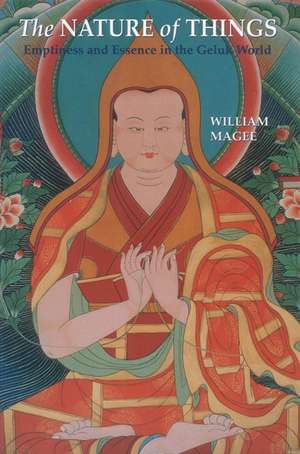The Nature of Things: Emptiness and Essence in the Geluk World
Autor William Mageeen Limba Engleză Paperback – 30 apr 2000
This book presents Dzong-ka-ba's discussion of the overly narrow object in his Great Exposition and relates that discussion to Nagarjuna's verses in Treatise on the Middle. When combined with an understanding of an overly broad object to be negated, this topic brings the Middle Way practitioner to a precise identification of the nonexistent object-of-negation nature as being a thing's establishment by way of its own entity.
This book also presents Dzong-ka-ba's more mainstream commentary on the subject in the Ocean of Reasoning sections, which are translated in Part Two. It also describes Dzong-ka-ba's strong reaction to the positive and independent nature asserted by Tibet's greatest synthesist, Dol-bo Shay-rap-gyel-tsen (fourteenth century).
Preț: 169.50 lei
Nou
Puncte Express: 254
Preț estimativ în valută:
32.44€ • 35.25$ • 27.27£
32.44€ • 35.25$ • 27.27£
Carte disponibilă
Livrare economică 31 martie-14 aprilie
Preluare comenzi: 021 569.72.76
Specificații
ISBN-13: 9781559391450
ISBN-10: 1559391456
Pagini: 244
Dimensiuni: 154 x 229 x 20 mm
Greutate: 0.4 kg
Editura: Snow Lion Publications
ISBN-10: 1559391456
Pagini: 244
Dimensiuni: 154 x 229 x 20 mm
Greutate: 0.4 kg
Editura: Snow Lion Publications
Notă biografică
William Magee has a PhD in Buddhist Studies from the University of Virginia. For the past twelve years, he has taught the University of Virginia's internationally famed summer Tibetan language program. Magee currently teaches at the University of North Carolina, Greensboro.
Textul de pe ultima copertă
Nature is a topic in many Indian and Tibetan philosophical texts. However, the meaning of "nature" varies in Hindu and Buddhist scriptures. As the author points out, even a cursory glance at sources reveals twelve different meanings of nature.
Nagarjuna and Chandrakirti are the two most important philosophers in Indian Mahayana Buddhism, and Dzong-ka-ba is the great reformer and philosopher of Tibetan Buddhism, one of the world's greatest intellects and most prolific writers in this area of study.
